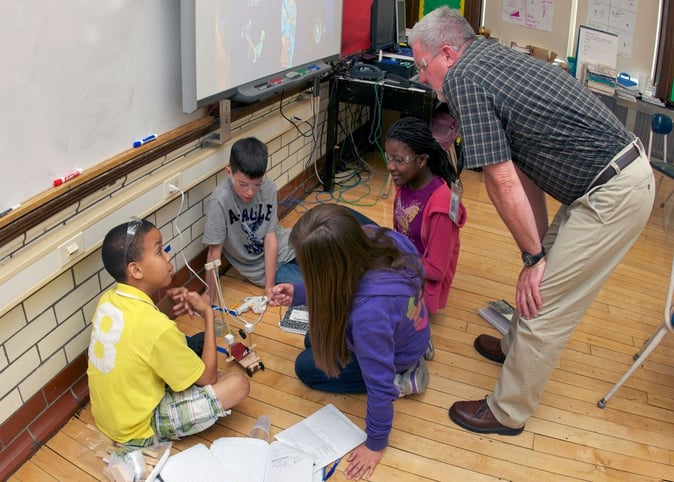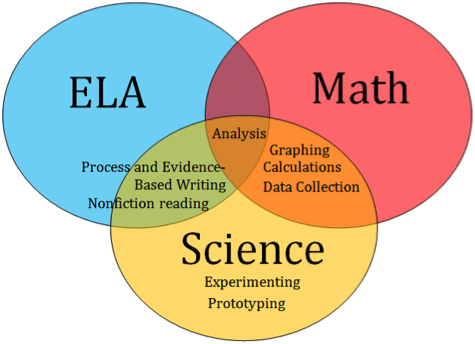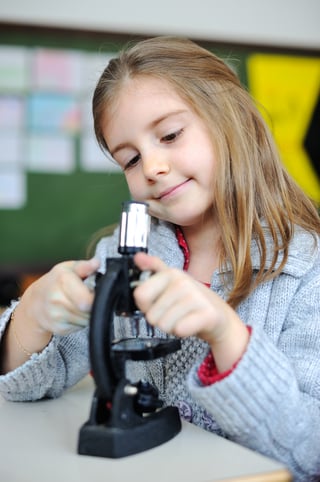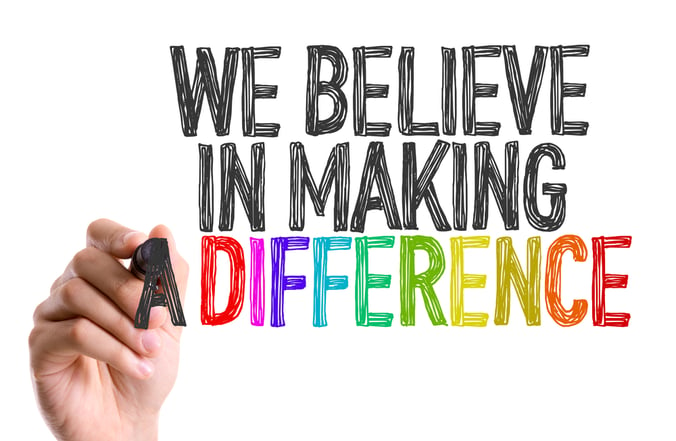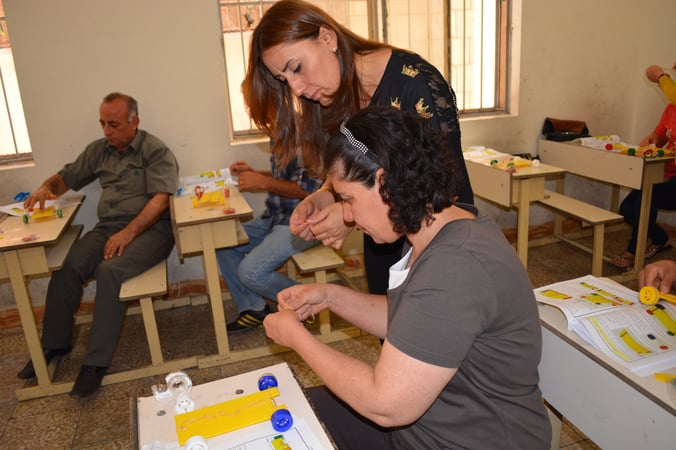What is CER? CER stands for Claim, Evidence, Reasoning. It is essentially a framework that educators use to teach the scientific method. Simplified, it looks like:
Claim (answer to a question) + Evidence (student’s data) + Reasoning (scientific principle or rule)
When we ask students to support scientific claims using CER and we model thinking moves in the process, we help spark their own curiosity about the world around them. When teachers introduce KnowAtom’s hands-on engineering labs and science experiments, they are bringing real world phenomena into the classroom. And when students make a scientific claim and back it up, they are taking charge of their own learning process.
Learning about thinking moves was one of the most transformative steps in my 20-year teaching career. One of my favorite quotes is from an American writer, Elbert Hubbard, who said, “The object of teaching a child is to enable him to get along without a teacher.” Thinking moves provide a structured approach to better understanding how we think. For teachers, it’s also a well-tested strategy to help propel students towards learning connected to their own natural curiosity and cognitive abilities. When students take the reins in the classroom, studies overwhelmingly show that engagement levels rise, and learning outcomes do too.
Thinking Moves in the Classroom, CER, and NGSS
Whether you are an educator, parent, guardian, or principal – you can learn from teachers who incorporate thinking moves into their classrooms. Thinking moves help students develop a much deeper level of understanding of the topic at hand. Here’s a list of thinking moves developed by the authors of Making Things Visible (2011):
1. Observing closely and describing what’s there
2. Building explanations and interpretations
3. Reasoning with evidence
4. Making connections
5. Considering different viewpoints and perspectives
6. Capturing the heart and forming conclusions
7. Wondering and asking questions
8. Uncovering complexity and going below the surface of things
You’ve probably already noticed how well these go along with next generation science skills (NGSS). For those teaching science and engineering practices in the classroom – here’s how thinking moves align directly with STEM:
Topics: Next Generation Science Standards, STEAM, Thinking Moves, Frame Model, Discourse Frames
As a science teacher for over 20 years, I’ve seen a lot of teaching strategies come and go. Today, the focus is on Next Generation Science Standards (NGSS) to help prepare students to join the workforce of the future. The teaching methods required by NGSS are based on constructivism – the idea that learners actively create new knowledge and understanding based on what they already know. Concept mapping is one way to help students link new ideas to knowledge they already have.
Continue readingTopics: Next Generation Science Standards, STEAM, interactive science, Professional Development, Inquiry Based Learning, STEAM Curriculum, Next Generation Science, Implementing New Science Standards, NGSS-Designed Curriculum, Next Generation Science Classroom Instruction, Phenomena-Based Learning, science education, Remote Learning, Formative Assessment
KnowAtom’s interactive science curriculum is designed to help students strengthen teamwork, collaboration and group communication skills through authentic instruction, hands-on lab work, and student-centered STEM investigations. As a result, teachers who use the Next Generation Science Standards (NGSS)-based curriculum report improved collaboration among their students, as they work together in teams to investigate, question, and explain core theories. One researcher from Northeastern University, Dr. Tracy L. Waters, evaluated KnowAtom implementation in fourth and fifth grade science classrooms and identified diverse examples of increased collaboration amongst students throughout the year.
Continue readingTopics: Next Generation Science Standards, higher order thinking, Professional Development, Implementing New Science Standards, Time on Learning
An in depth look at the use of KnowAtom’s science curriculum by fourth and fifth grade teachers by Northeastern University researcher Dr. Tracy L. Waters revealed major changes in both teaching practices and the teacher’s expectations of what students can achieve. The educators who participated in Waters’ study expressed having higher expectations of their students after implementing the hands-on curriculum that aligns with Next Generation Science Standards (NGSS).
Continue readingTopics: science and engineering practices, Inquiry Based Learning, Next Generation Science, NGSS-Designed Curriculum, New Standardized Testing
Research from Northeastern University’s Dr. Tracy L. Waters shows that using the KnowAtom Next Generation Science Standards (NGSS)-based curriculum is helping teachers spark excitement from young learners. Promoting differentiation in how students are taught core science concepts, build 21st century career skills, and utilize scientific process for hands-on discovery is helping improve student success and increase collaboration and engagement in the classroom.
Continue readingTopics: Middle School Science Curriculum, 5E Instructional Model, Next Generation Science, Implementing New Science Standards, NGSS-Designed Curriculum, Next Generation Science Classroom Instruction
One of the highlights of Northeastern University researcher Dr. Tracy L. Waters’ review of fourth and fifth grade science classrooms using the KnowAtom curriculum is a shift in both teaching methods and belief in what students can achieve together. Dr. Waters evaluated classrooms using Next Generation Science Standards (NGSS) led by teachers who had been teaching the KnowAtom curriculum for at least two years and who ranged in teaching experience from 2 to 25 years.
Continue readingTopics: Professional Development, NGSS-Designed Curriculum, Next Generation Science Classroom Instruction, science education
In 2015, the National Research Council released it’s landmark Guide to Implementing the Next Generation Science Standards. The framework for K-12 Science Education and Next Generation Science Standards (NGSS) was a vision for how to teach hands-on science processes and practices to build the skills needed for the workforce of the future. Since then, NGSS have been adopted by at least forty-five states and the District of Columbia, impacting the vast majority of the U.S. school aged population, according to Northeastern University researcher Dr. Tracy L. Waters.
Continue readingTopics: Professional Development, Implementing New Science Standards
A new era of learning has arrived. The Next Generation Science Standards (NGSS) for K-12 has dramatically transformed the way students learn, leading to a deeper level of understanding of critical scientific concepts. The eight fundamental science practices of the NGSS are designed to generate curricula that nurtures students’ capacity to think critically about key scientific theories, utilize skills learned in other areas of study to communicate their findings, and collaborate with their peers to work towards common goals.
Continue readingTopics: Professional Development, Middle School Science Curriculum, NGSS-Designed Curriculum, Evaluating Curriculum
Implementing a Next Generation Science Standards (NGSS)-based curriculum transforms educators from transmitters of information to facilitators of learning. KnowAtom’s innovative approach to teaching science helps transform classrooms into collaborative teaching laboratories – where students take the lead in their own learning process. That’s just what Northeastern University researcher Dr. Tracy L. Waters found when evaluating fourth and fifth grade science teachers implementing KnowAtom – measurable improvements in student learning, as well as changes in teaching methods, as educators began to give students more responsibility in the learning process.
Continue readingTopics: Next Generation Science Standards, Professional Development, STEAM Curriculum
Northeastern University research finds that public school classrooms using KnowAtom’s STEM curriculum designed for NGSS observed a variety of positive and sought-after results, from shifts in teacher beliefs about teaching and learning to improved student engagement to increased standardized test scores and more collaborative student classroom behavior.
The independent research reviewed KnowAtom curriculum designed for NGSS in elementary and middle school classrooms of professional public school teachers in multiple schools, including urban schools with high percentages of special populations including English Learners (ELs).
The research titled “The Effects of the Next Generation Science Standards (NGSS) on Teaching Practices: An Instrumental Case Study” by Dr. Tracy L. Waters, found KnowAtom designed for NGSS effectively integrated the goals of the Next Generation Science Standards and strongly supported elementary and middle school teachers in effectively making instructional and curricula shifts necessary with strong evidence of transformed student performance and engagement as a result.
Continue readingTopics: Professional Development, Next Generation Science, Case Studies, Next Generation Science Classroom Instruction, NGSS-Aligned Curriculum
New research from Northeastern University researcher Dr. Tracy L. Waters identifies the changes middle and elementary school teachers made to their instructional practices when implementing KnowAtom’s Next Generation Science Standard (NGSS)-based curriculum. She describes the KnowAtom curriculum as “built on an innovative approach to teaching science based on the NGSS, where teachers become facilitators of learning rather than givers of information.” Her research shows just how much “teaching practice was transformed through curriculum implementation when teachers began to release responsibility to students…”.
Continue readingTopics: Next Generation Science Standards, Policy, Professional Development, Implementing New Science Standards, Next Generation Leadership
Science education is changing for the better.
According to recent research, schools that adopt Next Generation Science Standards (NGSS) through the KnowAtom curriculum achieve better results through robust support and education for teachers. These research-based instructional practices give teachers a shared platform for NGSS best practices and create a dynamic partnership that brings together teachers, administrators, and curriculum and professional development providers.
All of this adds up to a clear path to putting research into effective everyday practice – and a clear win for students as well.
NGSS Curriculum Supports Teachers with Shared Platform for Professional Development and Best Practices
Continue reading
Topics: student results, Professional Development, STEM schools, Case Studies, Evaluating Curriculum, NGSS-Aligned Curriculum
According to research highlighted in “The Effects of the Next Generation Science Standards (NGSS) on Teaching Practices: An Instrumental Case Study” by Dr. Tracy Leann Waters of Northeastern University, teachers and students alike are transformed when districts adopt KnowAtom curriculum with its focus on inquiry, discovery and professional development.
Professional development helps science teachers engage with new standards and spark greater student interest. While professional development opportunities sometimes fall short when it comes to implementing new science curriculum,
Continue readingConnecting students with phenomena-based science, technology, engineering, and math (STEM) learning opportunities is a driving force behind building the workforce of the future. For school leaders and teachers just starting to implement new hands-on learning models and those who have been incorporating collaborate STEM education for years, understanding the measurable effect on student learning and engagement levels is important. One Northeastern University researcher set out to evaluate the impact of implementing the collaborative, hands-on KnowAtom science curriculum in elementary and middle school classrooms.
Topics: Professional Development, Implementing New Science Standards, NGSS-Designed Curriculum, Case Studies, NGSS-Aligned Curriculum
How would you teach differently if you couldn’t give your students a test until a year later?
Ron Ritchhart posed this question in his book Making Thinking Visible. It’s also one of the favorite quotes of Judy Higgins, a veteran fifth-grade science teacher in Lawrence, Massachusetts.
When she first began teaching, she often wondered why her students would come in on Tuesday and not remember what they learned on Monday. This challenge led her to make changes to create a culture of thinking in her classroom. This culture shift helped her students make meaningful connections, prompting better learning—and retention. “I help my students become thinkers, become curious, and learn how to solve problems; I have seen them be able to do end-of-the-year tests with great confidence because they know how to think,” Higgins says.
How did she do it?
Continue reading

